激素受体阳性发转移乳腺癌的治疗选择
乳腺癌的靶向药物治疗

乳腺癌的靶向药物治疗靶向药物治疗是指根据癌细胞的分子特征,通过选择性地靶向干预癌细胞关键信号通路或特定分子的药物治疗方法。
相比传统的放化疗,靶向药物治疗具有毒副作用小、疗效高、不易产生药物耐药性等优点。
在乳腺癌领域,靶向药物治疗已经取得了一系列的突破,为乳腺癌患者带来了新的治疗思路和选择。
目前,乳腺癌靶向药物治疗的研究主要集中在以下几个方面:1. 激素受体阳性乳腺癌的靶向治疗激素受体阳性乳腺癌是乳腺癌中最常见的分子亚型,约占乳腺癌的70%。
激素受体阳性乳腺癌的发展受激素依赖,因此靶向激素受体信号通路成为治疗的重点。
目前,临床上常用的靶向激素受体阳性乳腺癌的药物主要包括雌激素受体拮抗剂和抑制剂,如他莫昔芬、阿那曲唑等,这些药物可以通过干扰雌激素与受体的结合,抑制乳腺癌的生长和转移。
HER2受体也是激素受体阳性乳腺癌患者的治疗靶点之一。
HER2受体阳性乳腺癌具有侵袭性和转移性较强的特点,传统治疗方法往往难以取得满意的治疗效果。
目前,已经开发出了一系列针对HER2受体的靶向药物,如赫替唑和曲妥珠单抗等,这些药物可以有效地抑制HER2受体的信号传导,从而达到治疗乳腺癌的目的。
2. BRCA1/2突变乳腺癌的靶向治疗乳腺癌患者中存在一部分患者携带BRCA1/2基因突变,这些患者往往具有家族遗传性乳腺癌的风险。
针对BRCA1/2突变乳腺癌的靶向治疗成为了研究的热点。
PARP抑制剂是针对BRCA1/2突变乳腺癌的一种新型靶向药物,它可以抑制PARP酶的活性,导致DNA损伤修复受阻,从而导致乳腺癌细胞的凋亡和死亡。
临床试验结果表明,PARP抑制剂在治疗BRCA1/2突变乳腺癌方面取得了良好的疗效,为这类患者带来了新的治疗选择。
3. 免疫治疗在乳腺癌中的应用乳腺癌靶向药物治疗是乳腺癌治疗领域的一个新兴方向,它为乳腺癌患者带来了新的治疗选择和希望。
需要指出的是,靶向药物治疗并非适用于所有的乳腺癌患者,治疗方案应该根据患者的分子分型、临床病理特征以及个体情况来确定。
乳腺癌内分泌治疗原则

另外,还需要注意: 1、正在接受LH-RH(促黄体生成素释放激素)激动剂或拮抗剂治疗的妇女无法判断是否绝经。 2、 辅助化疗前没有绝经的妇女,停经不能作为判断绝经的依据,因为患者在化疗后虽然会停止排卵或无月经,但卵巢功能仍可能正常或有恢复可能。
3、因子宫疾病切除了子宫的患者,虽无月经表现,但卵巢功能可以是正常的,是否真正绝经务必进行卵巢功能检测后才能判断。 4、对于化疗引起停经的妇女,如果考虑采用芳香化酶抑制剂作为内分泌治疗,则需要考虑有效地卵巢抑制(双侧卵巢完整切除或药物抑制),或者连续多次监测 FSH/或雌二醇水平已确认患者处于绝经后状态。
适应症:可用于在抗雌激素辅助治疗后或治疗过程中复发的,或是在抗雌激素治疗中进展的绝经后(包括自然绝经和人工绝经)雌激素受体阳性的局部晚期或转移性乳腺癌。使用方法:推荐剂量为每月给药一次,一次250毫克,臀部缓慢肌注。
六、孕激素类 孕激素类主要拮抗雌激素对乳腺的作用,抑制垂体前叶分泌泌乳素,阻止ER在细胞核内积蓄,从而发挥抗乳腺癌作用。其作用虽与是否绝经及激素受体有关,但明显比其他内分泌药物所受影响小。
七、芳香化酶抑制剂 (1)作用机理:绝经前的雌激素主要来自卵巢,绝经后卵巢产生的雌激素逐渐减少进而停止,由肾上腺、脂肪、肌肉、肝脏、乳腺及乳腺癌中的雄烯二酮及雄激素芳香化而产生雌激素。
芳香化酶抑制剂分为三代:第一代 氨鲁米特(AG)第二代 法曲唑(非甾体类) 福美坦(甾体类) 又名兰他隆,已不用第三代 来曲唑Letrozole(非甾体类)弗隆 芙瑞 阿那曲唑Anostraxole(非甾体类) 瑞宁德 瑞婷 依西美坦Exemestane(甾体类) 尤尼坦 可怡
HRHer2晚期乳腺癌的治疗选择

HRHer2晚期乳腺癌的治疗选择一、引言乳腺癌是全球女性最常见的恶性肿瘤之一,而HR+HER2-晚期乳腺癌则是其中最具挑战性的一种亚型。
这种病情的复杂性要求医生根据患者的具体情况制定个性化的治疗方案。
本文将探讨HR+HER2-晚期乳腺癌的治疗选择。
二、治疗策略1、激素治疗对于HR+HER2-晚期乳腺癌,激素治疗是一种常见的选择。
通过抑制雌激素的合成或阻断雌激素受体,激素治疗可以减缓肿瘤的生长和扩散。
常用的激素治疗药物包括他莫昔芬、来曲唑和阿那曲唑等。
2、化疗化疗是一种通过破坏癌细胞DNA来阻止肿瘤生长的治疗方法。
对于HR+HER2-晚期乳腺癌,常用的化疗药物包括紫杉醇、多西他赛和长春瑞滨等。
化疗通常用于激素治疗无效或病情进展迅速的患者。
3、免疫治疗免疫治疗是一种利用患者自身的免疫系统攻击肿瘤的治疗方法。
近年来,免疫治疗在乳腺癌领域取得了重大进展。
对于HR+HER2-晚期乳腺癌,一些免疫治疗药物如帕博西尼、纳武单抗等已显示出一定的疗效。
4、其他治疗方法其他治疗方法包括靶向治疗和放疗等。
靶向治疗针对肿瘤细胞的特定分子靶点,如针对HER2的曲妥珠单抗等。
放疗主要用于局部控制肿瘤,减轻疼痛和改善生活质量。
三、治疗选择建议对于HR+HER2-晚期乳腺癌的治疗选择,医生会根据患者的病情、身体状况、既往治疗经历和患者意愿综合考虑。
以下是一些建议:1、激素治疗通常是首选,因为它相对安全且副作用较轻。
如果激素治疗无效或病情进展,则考虑化疗或免疫治疗。
2、对于较年轻的患者,化疗可能是一个更好的选择,因为它更有可能攻击快速增长的肿瘤细胞。
然而,化疗的副作用也需要充分考虑。
3、免疫治疗是一种新兴的治疗方法,对于某些患者可能是一个有效的选择。
然而,免疫治疗的疗效和安全性需要进一步研究和观察。
4、靶向治疗可以针对特定的分子靶点,但对于HR+HER2-晚期乳腺癌的治疗效果尚不明确。
放疗主要用于缓解症状和改善生活质量。
5、在制定治疗方案时,医生应充分与患者沟通,解释各种治疗方法的优缺点,并尊重患者的治疗意愿。
乳腺癌的内分泌治疗(一)

乳腺癌的内分泌治疗(一)引言概述:乳腺癌是女性常见的恶性肿瘤之一,其发病率逐年增加。
内分泌治疗作为乳腺癌的重要治疗方法之一,通过影响激素水平来控制乳腺癌的生长和转移。
本文将从五个方面介绍乳腺癌的内分泌治疗,包括激素受体和荷尔蒙依赖性乳腺癌、内分泌治疗的作用机制、雌激素受体调节剂、雌激素合成酶抑制剂和黄体生成素释放激素类似物。
正文内容:一、激素受体和荷尔蒙依赖性乳腺癌1. 乳腺组织中的激素受体分布情况2. 荷尔蒙依赖性乳腺癌的概念和分类3. 激素受体阳性乳腺癌的内分泌治疗策略二、内分泌治疗的作用机制1. 阻断雌激素受体的结合2. 抑制雌激素合成3. 阻断黄体生成素释放4. 抑制雌激素的作用三、雌激素受体调节剂1. 选择性雌激素受体调节剂的作用2. 常用的雌激素受体调节剂及其副作用3. 雌激素受体调节剂在乳腺癌内分泌治疗中的应用四、雌激素合成酶抑制剂1. 雌激素合成酶抑制剂的作用机制2. 常用的雌激素合成酶抑制剂及其副作用3. 雌激素合成酶抑制剂在乳腺癌内分泌治疗中的应用五、黄体生成素释放激素类似物1. 黄体生成素释放激素类似物的作用机制2. 常用的黄体生成素释放激素类似物及其副作用3. 黄体生成素释放激素类似物在乳腺癌内分泌治疗中的应用总结:乳腺癌的内分泌治疗是一种重要的治疗方法,可以通过调节激素水平来控制乳腺癌的生长和转移。
激素受体和荷尔蒙依赖性乳腺癌、内分泌治疗的作用机制、雌激素受体调节剂、雌激素合成酶抑制剂和黄体生成素释放激素类似物等是乳腺癌内分泌治疗的重要内容。
研究和应用这些治疗方法有助于提高乳腺癌的治疗效果,延长患者的生存期。
乳腺癌转移治疗方案

乳腺癌转移治疗方案乳腺癌转移治疗方案概述乳腺癌是女性最常见的恶性肿瘤之一,早期诊断和治疗对于提高患者的存活率至关重要。
然而,有些乳腺癌患者在初步治疗后出现转移,这给治疗带来了更大的挑战。
本文将介绍乳腺癌转移的治疗方案。
乳腺癌转移治疗方案第一线治疗乳腺癌的转移治疗通常有两个目标:控制肿瘤的进展和减轻症状。
第一线治疗包括药物治疗和手术治疗。
药物治疗药物治疗是乳腺癌转移的主要治疗方式之一。
常用的药物包括化疗药物、内分泌治疗药物和靶向治疗药物。
- 化疗药物:常用化疗药物包括紫杉醇、卡铂等,通过杀死癌细胞来控制肿瘤的增长和扩散。
- 内分泌治疗药物:内分泌治疗适用于激素受体阳性的乳腺癌患者,常用药物包括雌激素拮抗剂和雌激素合成酶抑制剂。
- 靶向治疗药物:靶向治疗药物针对乳腺癌的特定靶点,能够干扰癌细胞的生长和分裂。
常用靶向治疗药物包括曲妥珠单抗和帕博利珠单抗等。
手术治疗手术治疗适用于早期乳腺癌转移的患者,主要目的是切除肿瘤,减轻症状,并达到控制肿瘤的效果。
手术方法包括乳房保留手术和全乳切除手术。
第二线治疗如果第一线治疗失败或不适用,可以考虑进行第二线治疗。
第二线治疗主要包括靶向治疗和免疫治疗。
- 靶向治疗:靶向治疗药物通常通过干扰肿瘤细胞的信号通路来控制肿瘤的发展。
常用的靶向治疗药物包括赫赛汀和曲妥珠单抗等。
- 免疫治疗:免疫治疗是一种新兴的治疗方式,通过增强患者自身免疫系统的功能来抑制肿瘤的生长。
免疫治疗药物包括PD-1抑制剂和CTLA-4抑制剂等。
辅助治疗除了药物治疗和手术治疗,辅助治疗也十分重要。
辅助治疗包括放射治疗和康复治疗。
- 放射治疗:放射治疗通过高能射线来杀死肿瘤细胞,常用于术后辅助治疗,以减少肿瘤的复发。
- 康复治疗:康复治疗通过物理疗法、心理疗法和营养辅助等综合手段,帮助乳腺癌转移患者恢复身体功能。
总结乳腺癌转移的治疗包括第一线治疗、第二线治疗和辅助治疗。
药物治疗和手术治疗是第一线治疗的主要方式,包括化疗药物、内分泌治疗药物和靶向治疗药物。
乳腺癌后激素治疗方案

摘要:乳腺癌是女性最常见的恶性肿瘤之一,其中激素受体阳性的乳腺癌患者,内分泌治疗是重要的治疗手段。
本文旨在探讨乳腺癌后激素治疗方案,包括药物选择、治疗方案制定、疗效监测及不良反应处理等方面。
一、激素治疗方案概述乳腺癌后激素治疗方案主要包括内分泌治疗、抗雌激素治疗和抗雄激素治疗。
内分泌治疗是针对激素受体阳性的乳腺癌患者,通过抑制雌激素或降低雌激素水平来达到治疗目的。
抗雌激素治疗和抗雄激素治疗则是通过干扰雌激素或雄激素的作用来抑制肿瘤生长。
二、药物选择1. 抗雌激素药物:主要包括芳香化酶抑制剂(AI)、选择性雌激素受体调节剂(SERM)和抗雌激素抗体。
其中,AI通过抑制芳香化酶活性,降低雌激素水平;SERM具有雌激素和抗雌激素的双重作用,可调节雌激素受体活性;抗雌激素抗体可特异性结合雌激素受体,抑制其活性。
2. 抗雄激素药物:主要包括非甾体类抗雄激素药物和甾体类抗雄激素药物。
非甾体类抗雄激素药物可抑制睾酮合成,降低雄激素水平;甾体类抗雄激素药物可抑制睾酮与受体结合,降低雄激素作用。
三、治疗方案制定1. 内分泌治疗:对于激素受体阳性的乳腺癌患者,内分泌治疗是首选治疗方案。
治疗方案包括:(1)单药治疗:适用于病情较轻的患者,如他莫昔芬(Tamoxifen)或芳香化酶抑制剂。
(2)联合治疗:适用于病情较重的患者,如他莫昔芬联合芳香化酶抑制剂或抗雌激素抗体。
2. 抗雌激素治疗:对于激素受体阳性的乳腺癌患者,抗雌激素治疗可作为内分泌治疗的辅助手段。
3. 抗雄激素治疗:对于激素受体阳性的乳腺癌患者,抗雄激素治疗可作为内分泌治疗的辅助手段。
四、疗效监测1. 临床监测:定期进行体格检查、乳腺超声、乳腺钼靶等检查,观察病情变化。
2. 生化指标监测:定期检测血清雌二醇、睾酮等激素水平,评估治疗效果。
3. 肿瘤标志物监测:如CA153、CEA等,观察病情变化。
五、不良反应处理1. 抗雌激素药物不良反应:(1)潮热、出汗:可使用非甾体类抗炎药、抗抑郁药等对症治疗。
乳腺癌内分泌治疗的药物选择

乳腺癌内分泌治疗的药物选择摘要】乳腺癌是女性最常见的恶性肿瘤之一,为我国女性恶性肿瘤的第二位,对妇女健康构成了严重威胁。
如果患者雌激素受体(ER)或(和)孕激素受体(PR)阳性,推荐使用内分泌治疗。
在所有的抗激素治疗药物中,他莫昔芬、阿那曲唑、来曲唑和依西美坦是最常用的。
黄体生成素释放激素(LHRH)拮抗剂用于治疗绝经前晚期转移性乳腺癌(MBC),常用的有戈舍瑞林、亮丙瑞林,也可以起到药物去势作用。
对经前患者,他莫昔芬可作为一线治疗方案。
绝经后患者,AI类药物应该是首选。
内分泌治疗的缓解期长于化疗的缓解期。
内脏转移者,不适合内分泌治疗。
【关键词】乳腺癌内分泌治疗药物选择【中图分类号】R730.5 【文献标识码】A 【文章编号】1672-5085(2014)26-0017-02乳腺癌是女性最常见的恶性肿瘤之一,其发病率有逐年上升的趋势,为我国女性恶性肿瘤的第二位,对妇女健康构成了严重威胁[1]。
早期乳腺癌的辅助内分泌治疗及进展期转移性乳腺癌的内分泌治疗,对乳腺癌的生存受益得到了充分肯定。
内分泌治疗有效,是因为乳腺癌组织是激素依赖性的。
在绝经前的妇女中,如果乳腺癌的生长受到卵巢产生的雌激素的支持,那么通过切除卵巢来减少内源性雌激素的产生,或使用促黄体激素释放激素(LHRH)影响雌激素的生成等内分泌治疗,就可以控制乳腺癌的生长[2]。
在所有的抗激素治疗药物中,他莫昔芬、阿那曲唑、来曲唑和依西美坦是最常用的。
他莫昔芬(三苯氧胺)是一种SERM药物(选择性雌激素受体调节剂),后三种是AI药物(芳香化酶抑制剂)。
芳香化酶的主要作用是在绝经后妇女中将雄激素和其他前体转化为雌激素,而AI类药物主要是在细胞水平可逆或不可逆地抑制芳香化酶活性,从而阻止其催化雌激素的产生。
芳香化酶抑制剂还没有在绝经前妇女中显示作用,故主要应用在绝经后的乳腺癌患者。
此外,黄体生成素释放激素(LHRH)拮抗剂用于治疗绝经前晚期转移性乳腺癌(MBC),常用的有戈舍瑞林、亮丙瑞林等。
化疗联合内分泌在雌激素受体阳性乳腺癌新辅助治疗中的疗效
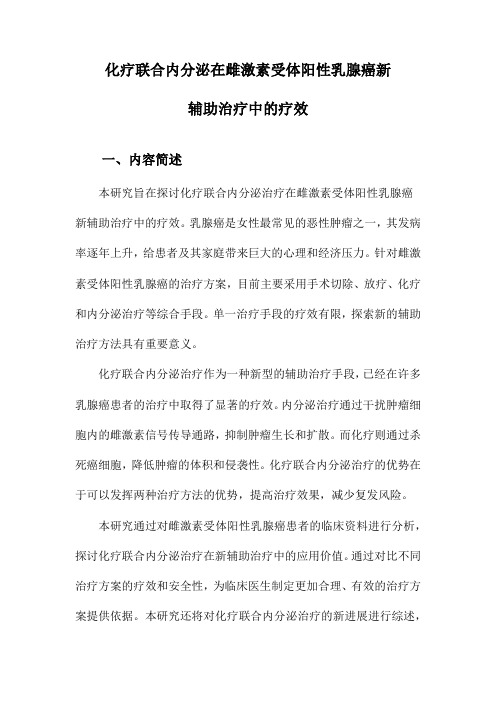
化疗联合内分泌在雌激素受体阳性乳腺癌新辅助治疗中的疗效一、内容简述本研究旨在探讨化疗联合内分泌治疗在雌激素受体阳性乳腺癌新辅助治疗中的疗效。
乳腺癌是女性最常见的恶性肿瘤之一,其发病率逐年上升,给患者及其家庭带来巨大的心理和经济压力。
针对雌激素受体阳性乳腺癌的治疗方案,目前主要采用手术切除、放疗、化疗和内分泌治疗等综合手段。
单一治疗手段的疗效有限,探索新的辅助治疗方法具有重要意义。
化疗联合内分泌治疗作为一种新型的辅助治疗手段,已经在许多乳腺癌患者的治疗中取得了显著的疗效。
内分泌治疗通过干扰肿瘤细胞内的雌激素信号传导通路,抑制肿瘤生长和扩散。
而化疗则通过杀死癌细胞,降低肿瘤的体积和侵袭性。
化疗联合内分泌治疗的优势在于可以发挥两种治疗方法的优势,提高治疗效果,减少复发风险。
本研究通过对雌激素受体阳性乳腺癌患者的临床资料进行分析,探讨化疗联合内分泌治疗在新辅助治疗中的应用价值。
通过对比不同治疗方案的疗效和安全性,为临床医生制定更加合理、有效的治疗方案提供依据。
本研究还将对化疗联合内分泌治疗的新进展进行综述,以期为今后的研究提供参考。
1.1 研究背景乳腺癌是全球女性最常见的恶性肿瘤之一,其发病率和死亡率逐年上升。
雌激素受体阳性(ER+)乳腺癌占所有乳腺癌的大部分,约占7080。
对于ER+乳腺癌患者,内分泌治疗在辅助治疗中具有重要地位。
传统的内分泌治疗方法如选择性雌激素受体调节剂(SERMs)和芳香酶抑制剂(AIs)的疗效有限,且存在一定的副作用。
寻找更有效的内分泌治疗方法已成为乳腺癌研究的重要课题。
化疗作为乳腺癌的主要治疗方法之一,已经在临床实践中取得了显著的疗效。
越来越多的研究表明,化疗联合内分泌治疗在ER+乳腺癌新辅助治疗中具有协同作用,可以提高患者的生存率和无病生存期。
目前关于化疗联合内分泌治疗在ER+乳腺癌新辅助治疗中的疗效仍存在争议,需要进一步的研究来证实其有效性和安全性。
本研究旨在探讨化疗联合内分泌治疗在ER+乳腺癌新辅助治疗中的疗效,为临床医生提供更合理的治疗方案。
乳腺癌最佳治疗方案

乳腺癌最佳治疗方案乳腺癌是女性最常见的恶性肿瘤之一,对于乳腺癌的治疗方案选择应根据患者的病情、年龄、体质和遗传因素等多个因素综合考虑。
以下是乳腺癌的最佳治疗方案的一般建议:一、手术治疗:手术是治疗乳腺癌的首要方法。
常见的手术方式有乳腺癌根治术、乳腺癌保乳手术和乳房整形手术。
对于早期发现的乳腺癌患者,保乳手术是一种适用的选择,可以保留患侧乳房组织,同时结合全乳腺射线治疗,可以获得良好的治疗效果。
二、辅助治疗:辅助治疗包括放疗、内分泌治疗和化疗。
放疗适用于保乳手术后、根治术后以及局部复发的乳腺癌患者,可以减少局部复发风险。
内分泌治疗适用于激素受体阳性的乳腺癌患者,通过使用雌激素阻断剂(如Tamoxifen)或雌激素合成酶抑制剂(如Aromatase Inhibitors)来降低激素水平,从而阻止癌细胞的生长和扩散。
化疗适用于高危患者,可以通过药物杀灭癌细胞,防止转移和复发。
三、靶向治疗:靶向治疗是一种针对乳腺癌诱导因子的治疗方法,可以提高治疗效果。
HER2阳性的乳腺癌患者可以接受HER2靶向药物如Trastuzumab和Pertuzumab治疗,可以显著改善预后。
四、个体化治疗:根据患者的基因型、代谢状态、药物耐受性等因素进行个体化治疗,可以提高治疗效果。
通过进行分子生物学检测和基因组测序,可以了解患者的乳腺癌基因型,从而指导药物选择和治疗方案制定。
总之,乳腺癌的最佳治疗方案应根据患者的具体情况来制定,包括手术治疗、辅助治疗、靶向治疗和个体化治疗。
综合应用多种治疗手段能够最大程度地提高治疗效果,延长患者的生存期,提高生活质量。
同时,患者在治疗过程中应加强营养与康复,保持良好的心态,积极面对治疗,良好合理的治疗方案可以为患者提供更好的治疗效果。
ASCO发布转移性乳腺癌激素治疗指南

ASCO发布转移性乳腺癌激素治疗指南美国临床肿瘤学会(ASCO),为激素受体阳性转移性乳腺癌女性的激素疗法治疗,提出了新的指南。
连续激素治疗是大多数女性的首选治疗方法。
连续激素治疗意味着女性接受一种激素治疗药物治疗,直到它没有效果或产生不可接受的副作用。
然后女性会接受了不同的激素治疗药物治疗。
转移性乳腺癌是从乳房区域扩散到身体其他部位的乳腺癌,例如骨骼、肝脏或大脑。
ASCO是肿瘤学家和其他癌症护理提供者的全国性组织。
ASCO指南为医生提供了大量可靠研究和有经验支持的治疗和检测建议。
Hope Rugo,医学博士,加州大学旧金山分校Helen Diller家庭综合癌症中心的医学临床教授,是制定指南的专家之一。
ASCO专家根据2008年至2015年期间发表的研究评估新指南。
主要建议如下:∙无论癌症是雌激素受体阳性还是孕激素受体阳性,都应该为被诊断患有激素受体阳性疾病的女性提供激素疗法。
∙除少数情况外,单独或联合使用激素治疗,应作为激素受体阳性转移性疾病的首选治疗方法。
∙治疗建议应基于妇女在手术后的治疗类型,无疾病的时间长短(如果癌症是复发),以及她的一般健康状况。
∙女性应该接受激素治疗直到癌症有进展。
∙不推荐将激素疗法与化疗相结合。
∙由于尚无完全治愈转移性乳腺癌的方法,医生应鼓励符合条件的妇女,参加适合其病情的临床试验。
∙应该给绝经后妇女提供芳香酶抑制剂作为第一种激素疗法。
∙芳香酶抑制剂和Faslodex(化学名:氟维司群,一种雌激素受体下调剂)的联合治疗,可用于治疗之前未接受过激素治疗的女性。
∙应该给绝经前妇女提供抑制卵巢功能的药物,或手术以除去卵巢以及激素治疗。
∙芳香酶抑制剂和靶向治疗Ibrance(化学名称:palbociclib)可以提供给之前未接受过乳腺癌治疗的女性。
∙如果癌症在治疗期间生长,可以向女性提供Afinitor(化学名称:依维莫司)以及芳香酶抑制剂Aromasin(化学名称:依西美坦)。
乳腺癌的常见治疗方法

乳腺癌的常见治疗方法乳腺癌是女性中常见的一种恶性肿瘤,也有一小部分男性患者。
乳腺癌的治疗方法主要包括手术、放疗、化疗、内分泌治疗和靶向治疗等。
下面将详细介绍乳腺癌的常见治疗方法。
一、手术治疗手术治疗是乳腺癌的主要治疗方法之一。
常见的手术方式包括乳房保留手术(即部分切除乳房)和乳房切除手术(即全乳房切除)。
乳腺癌早期患者可以选择乳房保留手术,而晚期患者则需要进行乳房切除手术。
乳腺癌手术的同时还需要进行腋窝淋巴结清扫术,以确定是否有转移。
对于存在淋巴结转移的患者,还需要进一步进行腋窝淋巴结放疗。
二、放射治疗放疗是乳腺癌治疗的常见方式之一,可用于术后辅助治疗、预防复发和转移。
放疗主要通过高能X射线或其他粒子束照射肿瘤部位,杀死残留的癌细胞,降低复发和转移的风险。
对于乳腺癌手术后患者,放疗一般在手术后数周内进行,并持续数周到数个月。
放疗过程通常需要分多次进行,每次治疗时间较短。
在放疗期间,患者需要定期前往医院接受治疗。
三、化学治疗乳腺癌的化学治疗是通过给患者使用抗癌药物,杀死体内的癌细胞或抑制其生长和扩散。
化疗通常用于手术前(新辅助化疗)或手术后的辅助治疗,以减小肿瘤的体积和降低转移风险。
化疗方案的选择根据患者的具体情况而定,一般会根据乳腺癌的类型、分期和患者的身体状况等因素进行个体化制定。
化疗周期一般为3-6个疗程,每个疗程间隔数周不等,患者需要在医院接受静脉输液治疗。
四、内分泌治疗内分泌治疗是通过使用内分泌药物干扰癌细胞的生长与转移,达到治疗乳腺癌的目的。
这种治疗方法主要适用于女性激素受体阳性的乳腺癌患者。
常见的内分泌治疗包括雌激素受体调节剂和雌激素拮抗剂。
前者主要用于绝经前女性患者,后者则适用于绝经后女性和男性患者。
内分泌治疗通常需要长期服用药物,定期进行复查,以确保治疗的有效性和安全性。
五、靶向治疗靶向治疗是根据肿瘤细胞的分子表面特征,选择特定的药物作用于癌细胞靶点,以阻断癌细胞的增殖和生存能力。
乳腺癌骨转移的治疗办法
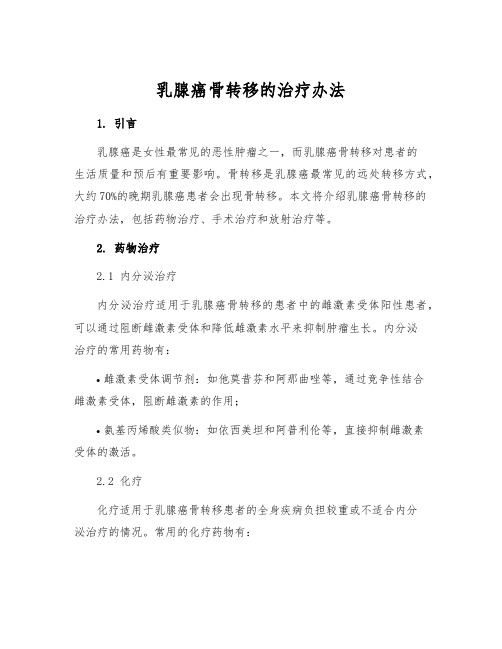
乳腺癌骨转移的治疗办法1. 引言乳腺癌是女性最常见的恶性肿瘤之一,而乳腺癌骨转移对患者的生活质量和预后有重要影响。
骨转移是乳腺癌最常见的远处转移方式,大约70%的晚期乳腺癌患者会出现骨转移。
本文将介绍乳腺癌骨转移的治疗办法,包括药物治疗、手术治疗和放射治疗等。
2. 药物治疗2.1 内分泌治疗内分泌治疗适用于乳腺癌骨转移的患者中的雌激素受体阳性患者,可以通过阻断雌激素受体和降低雌激素水平来抑制肿瘤生长。
内分泌治疗的常用药物有:•雌激素受体调节剂:如他莫昔芬和阿那曲唑等,通过竞争性结合雌激素受体,阻断雌激素的作用;•氨基丙烯酸类似物:如依西美坦和阿普利伦等,直接抑制雌激素受体的激活。
2.2 化疗化疗适用于乳腺癌骨转移患者的全身疾病负担较重或不适合内分泌治疗的情况。
常用的化疗药物有:•蒽环类药物:如多柔比星和表柔比星等,通过干扰细胞DNA复制和RNA合成,抑制肿瘤细胞的增殖;•塞替洛辛:通过抑制DNA和RNA的合成,抑制肿瘤细胞生长;•基站类药物:如紫杉醇和紫杉醇等,通过阻断微管的正常形成和功能,抑制肿瘤细胞的分裂。
2.3 靶向治疗靶向治疗是近年来乳腺癌骨转移治疗的重要进展,适用于HER2阳性乳腺癌患者。
常用的靶向治疗药物有:•曲妥珠单抗:通过抑制HER2阳性肿瘤细胞的生长信号传导,抑制肿瘤细胞的生长和增殖,改善预后;•拉帕替尼:通过抑制HER2阳性肿瘤细胞的生长信号传导,抑制肿瘤细胞的增殖。
3. 手术治疗乳腺癌骨转移患者中,有些患者可能需要手术治疗来减轻疼痛或稳定骨骼。
手术治疗的常见方法包括:•切除肿瘤:对于乳腺原发灶和局部进展的骨转移灶,可以进行切除手术,减轻疼痛并减缓骨骼破坏;•骨固定:对于发生骨折或骨不稳的患者,可以进行骨固定手术来稳定骨骼。
4. 放射治疗放射治疗在乳腺癌骨转移的治疗中起到重要作用,可以缓解疼痛、减缓骨骼破坏、改善生活质量。
放射治疗的常见方法包括:•外部放射治疗:通过将高能量X射线或质子束照射到肿瘤区域,破坏肿瘤细胞的DNA,达到杀死肿瘤的效果;•放射性核素治疗:通过给患者静脉注射放射性核素,使核素在骨组织中富集,通过放射性粒子杀死肿瘤细胞。
乳腺癌激素受体阳性乳腺癌的治疗
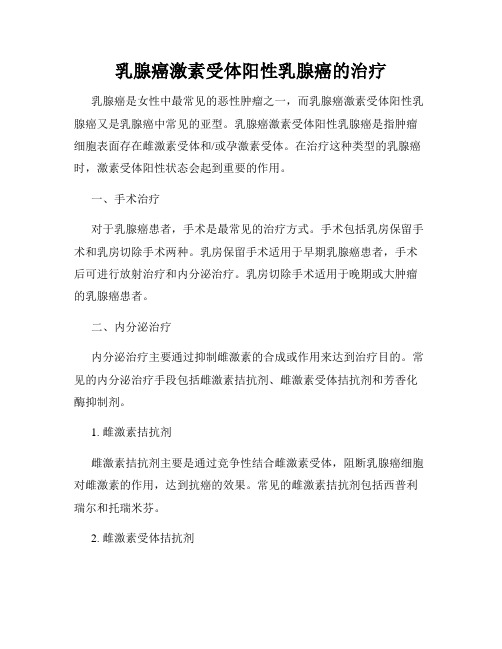
乳腺癌激素受体阳性乳腺癌的治疗乳腺癌是女性中最常见的恶性肿瘤之一,而乳腺癌激素受体阳性乳腺癌又是乳腺癌中常见的亚型。
乳腺癌激素受体阳性乳腺癌是指肿瘤细胞表面存在雌激素受体和/或孕激素受体。
在治疗这种类型的乳腺癌时,激素受体阳性状态会起到重要的作用。
一、手术治疗对于乳腺癌患者,手术是最常见的治疗方式。
手术包括乳房保留手术和乳房切除手术两种。
乳房保留手术适用于早期乳腺癌患者,手术后可进行放射治疗和内分泌治疗。
乳房切除手术适用于晚期或大肿瘤的乳腺癌患者。
二、内分泌治疗内分泌治疗主要通过抑制雌激素的合成或作用来达到治疗目的。
常见的内分泌治疗手段包括雌激素拮抗剂、雌激素受体拮抗剂和芳香化酶抑制剂。
1. 雌激素拮抗剂雌激素拮抗剂主要是通过竞争性结合雌激素受体,阻断乳腺癌细胞对雌激素的作用,达到抗癌的效果。
常见的雌激素拮抗剂包括西普利瑞尔和托瑞米芬。
2. 雌激素受体拮抗剂雌激素受体拮抗剂主要是通过与雌激素受体结合,阻止雌激素受体启动细胞增殖和分化的信号转导通路。
常见的雌激素受体拮抗剂包括法莫替丁和曲美他嗪。
3. 芳香化酶抑制剂芳香化酶抑制剂主要是通过抑制芳香化酶的活性,减少体内雌激素的合成,从而达到抑制乳腺癌细胞生长的目的。
常见的芳香化酶抑制剂包括阿那曲唑、雷洛替尼和依西美坦。
三、化学治疗化学治疗是指通过使用化学药物来杀灭或抑制肿瘤细胞的增殖。
常见的化学药物包括环磷酰胺、多柔比星和紫杉醇等。
化学治疗常与手术治疗或放射治疗联合进行,以提高治疗效果。
四、靶向治疗靶向治疗是根据肿瘤细胞特定分子表达的特征,通过用特异性抗体或小分子抑制剂抑制肿瘤细胞生长和传播。
针对乳腺癌激素受体阳性乳腺癌的靶向治疗主要是使用内参素和曲妥珠单抗。
五、放射治疗放射治疗是通过使用高能射线破坏癌细胞的DNA结构,达到杀灭癌细胞的目的。
对乳腺癌患者而言,放射治疗常与手术治疗联合进行,以减少肿瘤复发和提高生存率。
六、个体化治疗个体化治疗是根据患者的肿瘤特征和基因型,选择最适合的治疗方案。
乳腺癌的激素治疗方法
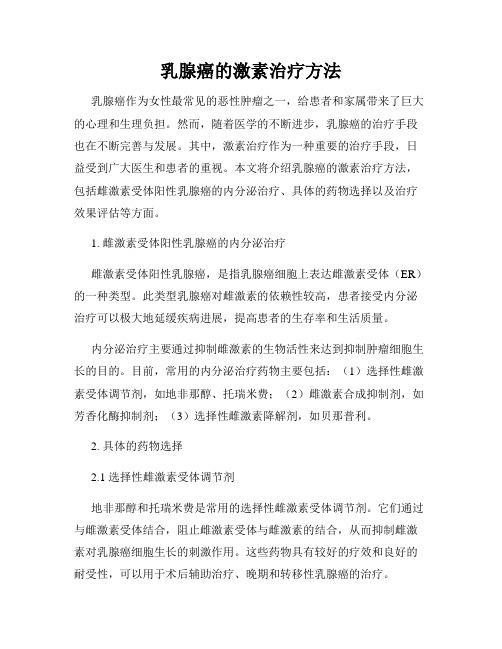
乳腺癌的激素治疗方法乳腺癌作为女性最常见的恶性肿瘤之一,给患者和家属带来了巨大的心理和生理负担。
然而,随着医学的不断进步,乳腺癌的治疗手段也在不断完善与发展。
其中,激素治疗作为一种重要的治疗手段,日益受到广大医生和患者的重视。
本文将介绍乳腺癌的激素治疗方法,包括雌激素受体阳性乳腺癌的内分泌治疗、具体的药物选择以及治疗效果评估等方面。
1. 雌激素受体阳性乳腺癌的内分泌治疗雌激素受体阳性乳腺癌,是指乳腺癌细胞上表达雌激素受体(ER)的一种类型。
此类型乳腺癌对雌激素的依赖性较高,患者接受内分泌治疗可以极大地延缓疾病进展,提高患者的生存率和生活质量。
内分泌治疗主要通过抑制雌激素的生物活性来达到抑制肿瘤细胞生长的目的。
目前,常用的内分泌治疗药物主要包括:(1)选择性雌激素受体调节剂,如地非那醇、托瑞米费;(2)雌激素合成抑制剂,如芳香化酶抑制剂;(3)选择性雌激素降解剂,如贝那普利。
2. 具体的药物选择2.1 选择性雌激素受体调节剂地非那醇和托瑞米费是常用的选择性雌激素受体调节剂。
它们通过与雌激素受体结合,阻止雌激素受体与雌激素的结合,从而抑制雌激素对乳腺癌细胞生长的刺激作用。
这些药物具有较好的疗效和良好的耐受性,可以用于术后辅助治疗、晚期和转移性乳腺癌的治疗。
2.2 芳香化酶抑制剂芳香化酶抑制剂主要包括阿那曲唑和依那司他。
它们通过抑制芳香化酶的活性,降低体内雌激素水平,从而达到治疗乳腺癌的效果。
这些药物适用于更年期后的乳腺癌患者,尤其是绝经后乳腺癌患者。
需要注意的是,芳香化酶抑制剂在使用过程中可能引起骨质疏松和关节痛等不良反应,应定期进行相关检测。
2.3 选择性雌激素降解剂贝那普利是目前唯一一种被批准用于乳腺癌激素治疗的选择性雌激素降解剂。
它可以通过抑制雌激素的合成和降解来减少体内雌激素的合成和降解,从而达到治疗乳腺癌的效果。
贝那普利在早期和晚期乳腺癌的治疗中,显示出良好的疗效和耐受性。
3. 治疗效果评估对于接受激素治疗的乳腺癌患者,需要定期进行治疗效果的评估。
乳腺癌内分泌治疗方案
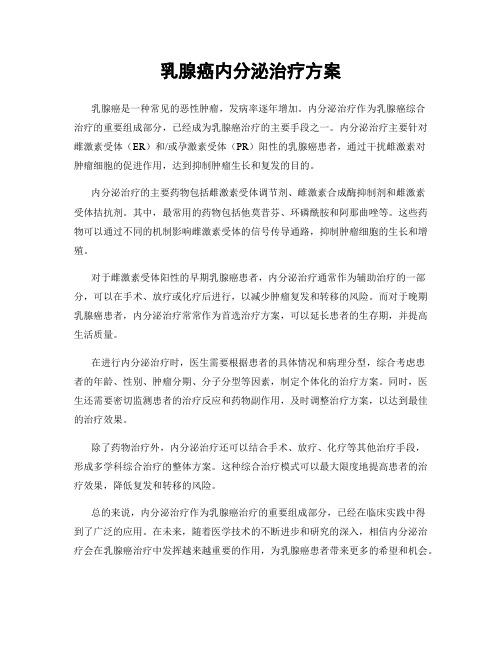
乳腺癌内分泌治疗方案
乳腺癌是一种常见的恶性肿瘤,发病率逐年增加。
内分泌治疗作为乳腺癌综合
治疗的重要组成部分,已经成为乳腺癌治疗的主要手段之一。
内分泌治疗主要针对雌激素受体(ER)和/或孕激素受体(PR)阳性的乳腺癌患者,通过干扰雌激素对
肿瘤细胞的促进作用,达到抑制肿瘤生长和复发的目的。
内分泌治疗的主要药物包括雌激素受体调节剂、雌激素合成酶抑制剂和雌激素
受体拮抗剂。
其中,最常用的药物包括他莫昔芬、环磷酰胺和阿那曲唑等。
这些药物可以通过不同的机制影响雌激素受体的信号传导通路,抑制肿瘤细胞的生长和增殖。
对于雌激素受体阳性的早期乳腺癌患者,内分泌治疗通常作为辅助治疗的一部分,可以在手术、放疗或化疗后进行,以减少肿瘤复发和转移的风险。
而对于晚期乳腺癌患者,内分泌治疗常常作为首选治疗方案,可以延长患者的生存期,并提高生活质量。
在进行内分泌治疗时,医生需要根据患者的具体情况和病理分型,综合考虑患
者的年龄、性别、肿瘤分期、分子分型等因素,制定个体化的治疗方案。
同时,医生还需要密切监测患者的治疗反应和药物副作用,及时调整治疗方案,以达到最佳的治疗效果。
除了药物治疗外,内分泌治疗还可以结合手术、放疗、化疗等其他治疗手段,
形成多学科综合治疗的整体方案。
这种综合治疗模式可以最大限度地提高患者的治疗效果,降低复发和转移的风险。
总的来说,内分泌治疗作为乳腺癌治疗的重要组成部分,已经在临床实践中得
到了广泛的应用。
在未来,随着医学技术的不断进步和研究的深入,相信内分泌治疗会在乳腺癌治疗中发挥越来越重要的作用,为乳腺癌患者带来更多的希望和机会。
乳癌三阳早期治疗方案

一、引言乳腺癌是全球女性最常见的恶性肿瘤之一,严重威胁着女性的生命健康。
其中,三阳乳腺癌(雌激素受体阳性、孕激素受体阳性、人表皮生长因子受体2阳性)患者,由于肿瘤细胞具有较高侵袭性和预后较差的特点,治疗难度较大。
本文针对乳癌三阳早期患者,探讨一种综合治疗方案,旨在提高患者的生活质量,延长生存期。
二、治疗方案1. 术前准备(1)完善相关检查:包括乳腺超声、乳腺MRI、血液检查等,明确肿瘤大小、位置、分期及是否存在远处转移。
(2)心理支持:给予患者心理疏导,减轻患者焦虑、恐惧等不良情绪。
(3)制定手术方案:根据患者具体情况,选择合适的手术方式,如保乳手术、改良根治术或全乳切除术。
2. 手术治疗(1)保乳手术:适用于肿瘤较小、单侧乳腺癌患者。
术中需切除肿瘤及其周围组织,并进行腋窝淋巴结清扫。
(2)改良根治术:适用于肿瘤较大、双侧乳腺癌或存在淋巴结转移的患者。
术中需切除乳腺、胸大肌、胸小肌及腋窝淋巴结。
(3)全乳切除术:适用于肿瘤较大、双侧乳腺癌或存在远处转移的患者。
术中需切除乳腺、胸大肌、胸小肌及腋窝淋巴结。
3. 术后辅助治疗(1)化疗:化疗是乳腺癌治疗的重要手段,可杀灭残存的癌细胞,降低复发风险。
乳癌三阳早期患者通常需进行6-8个周期的化疗,常用方案包括:-蒽环类药物+紫杉类药物:如蒽环类药物(多西他赛、表阿霉素等)+紫杉类药物(多西他赛、紫杉醇等)。
-蒽环类药物+卡培他滨:如蒽环类药物(多西他赛、表阿霉素等)+卡培他滨。
(2)内分泌治疗:雌激素受体阳性、孕激素受体阳性的患者,需进行内分泌治疗。
常用药物包括:-芳香化酶抑制剂:如来曲唑、阿那曲唑等。
-抗雌激素药物:如他莫昔芬、托瑞米芬等。
(3)靶向治疗:人表皮生长因子受体2阳性的患者,需进行靶向治疗。
常用药物包括:-曲妥珠单抗:针对HER2阳性的乳腺癌患者,可抑制肿瘤生长。
-帕妥珠单抗:与曲妥珠单抗联合使用,可提高疗效。
4. 放疗放疗是乳腺癌治疗的重要手段之一,可杀灭残留的癌细胞,降低复发风险。
乳腺癌的激素治疗方案

乳腺癌的激素治疗方案乳腺癌是一种常见的女性恶性肿瘤,其中激素受体阳性乳腺癌占据了很大比例。
对于这一亚型的乳腺癌,激素治疗成为了一种重要的治疗手段。
本文将介绍乳腺癌的激素治疗方案,包括选择适合的激素治疗药物以及激素治疗的潜在副作用及管理。
一、选择适合的激素治疗药物1. 荷尔蒙受体调节剂荷尔蒙受体调节剂是目前乳腺癌激素治疗的主要药物之一,分为选择性雌激素受体抑制剂(SERMs)和芳香化酶抑制剂(AI)。
SERMs如他莫昔芬(tamoxifen)、鲁尔凝(raloxifene)等可抑制乳腺癌细胞的雌激素受体,从而阻断雌激素的作用。
AI药物如阿那曲唑(anastrozole)、莫地非尼(letrozole)等则能够抑制芳香化酶的活性,从而降低体内雌激素水平。
患者的绝经状态、年龄、病情分期等因素会影响到药物的选择。
2. 雌激素拮抗剂雌激素拮抗剂是另一类常用的激素治疗药物,其通过抑制雌激素对肿瘤细胞的作用起到治疗作用。
其中,富马酸铁安芬(fulvestrant)是目前唯一一种被批准用于一线内分泌治疗的残酷抗肿瘤药物。
二、激素治疗的潜在副作用及管理虽然激素治疗在乳腺癌的治疗中具有重要意义,但也可能会导致一系列的副作用。
其中最常见的包括:1. 骨质疏松:长期使用荷尔蒙受体调节剂和雌激素拮抗剂可能增加骨质疏松的风险。
饮食中增加钙和维生素D的摄入,进行体育锻炼,定期检查骨密度,必要时补充抗骨质疏松药物可以有效预防骨质疏松。
2. 血栓风险增加:激素治疗可能导致血栓形成的风险增加。
患者需要定期监测血液凝结指标,避免久坐和长时间卧床,必要时可以使用抗凝血药物。
3. 情绪变化和潮红:某些激素治疗药物可能引起情绪变化和潮红等不适症状。
患者可以尝试健康的生活方式和心理调节方法,如早睡早起,规律运动,寻求心理支持等来缓解这些症状。
4. 代谢紊乱:激素治疗可能导致代谢紊乱,包括体重增加、血脂升高等。
患者需要注意饮食控制,避免高脂高糖饮食,保持适量的运动,必要时可以予以降脂药物治疗。
乳腺癌的内分泌治疗解读
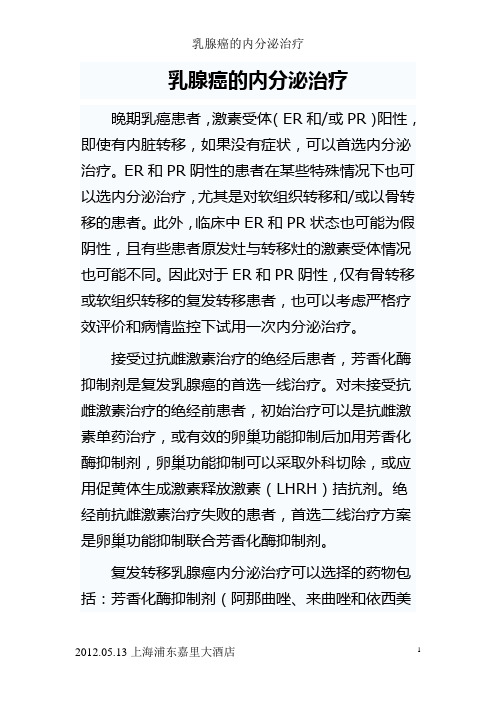
乳腺癌的内分泌治疗晚期乳癌患者,激素受体(ER和/或PR)阳性,即使有内脏转移,如果没有症状,可以首选内分泌治疗。
ER和PR阴性的患者在某些特殊情况下也可以选内分泌治疗,尤其是对软组织转移和/或以骨转移的患者。
此外,临床中ER和PR状态也可能为假阴性,且有些患者原发灶与转移灶的激素受体情况也可能不同。
因此对于ER和PR阴性,仅有骨转移或软组织转移的复发转移患者,也可以考虑严格疗效评价和病情监控下试用一次内分泌治疗。
接受过抗雌激素治疗的绝经后患者,芳香化酶抑制剂是复发乳腺癌的首选一线治疗。
对未接受抗雌激素治疗的绝经前患者,初始治疗可以是抗雌激素单药治疗,或有效的卵巢功能抑制后加用芳香化酶抑制剂,卵巢功能抑制可以采取外科切除,或应用促黄体生成激素释放激素(LHRH)拮抗剂。
绝经前抗雌激素治疗失败的患者,首选二线治疗方案是卵巢功能抑制联合芳香化酶抑制剂。
复发转移乳腺癌内分泌治疗可以选择的药物包括:芳香化酶抑制剂(阿那曲唑、来曲唑和依西美坦)、抗雌激素药物(他莫昔芬、托瑞米芬和氟维司群)和孕激素类药物(醋酸甲地孕酮和甲羟孕酮)。
内分泌药物的选择原则主要遵循:1、不重复使用辅助治疗阶段治疗失败的药物;2、他莫昔芬治疗失败的绝经后患者首选芳香化酶抑制剂AI治疗;3、绝经前乳癌患者,可采用手术切除或卵巢功能有效抑制治疗基础上,遵循绝经后患者内分泌治疗原则;4、芳香化酶抑制剂失败的可选择孕激素治疗或氟维司群;5、非甾体类芳香化酶抑制剂(阿那曲唑或来曲唑)治疗失败可选甾体类芳香化酶抑制剂(依西美坦)、孕激素或氟维司群;甾体类芳香化酶抑制剂治疗失败可选非甾体类芳香化酶抑制剂、孕激素或氟维司群。
6、既往未曾接受过抗雌激素治疗者仍可选择他莫昔芬或托瑞米芬。
抗雌激素药物氟维司群是激素受体阳性、抗雌激素或芳香化酶抑制剂经治再次进展的转移性乳腺癌患者的选择用药之一。
对于在既往的他莫昔芬治疗中疾病进展的患者,氟维司群与阿那曲唑有效率相似,但缓解持续时间更长。
- 1、下载文档前请自行甄别文档内容的完整性,平台不提供额外的编辑、内容补充、找答案等附加服务。
- 2、"仅部分预览"的文档,不可在线预览部分如存在完整性等问题,可反馈申请退款(可完整预览的文档不适用该条件!)。
- 3、如文档侵犯您的权益,请联系客服反馈,我们会尽快为您处理(人工客服工作时间:9:00-18:30)。
目录一、中文摘要 (1)二、英文摘要 (2)三、正文 (3)1.对象与方法 (3)1.1一般资料 (3)1.2 ER、PR、HER-2判定、术后分期、疗效及毒性评价标准 (3)1.3 统计学方法 (4)2.结果 (4)2.1术后的无病生存情况 (4)2.2 Her-2状态对无病生存期的影响 (4)2.3 辅助治疗的情况 (5)2.4出现复发转移后的一线治疗情况 (5)2.5 一线内分泌治疗情况 (6)2.6姑息化疗情况 (6)2.7 在两种不同一线治疗中观察到的毒副作用 (6)2.9死亡情况 (7)3.结论................................................ .74.讨论................................................ .7四、参考文献 (14)五、致谢 (18)六、综述 (19)激素受体阳性复发转移乳腺癌的治疗选择[摘要]目的:观察激素受体阳性复发转移乳腺癌治疗的疗效、毒副作用。
方法:回顾性的分析激素受体阳性的术后复发转移乳腺癌患者共83例。
结果:术后分期IIA期的病人(12.0%)中位DFS为46月;IIB期的病人(20.5%)中位DFS 为41月;IIIA期的病人(27.7%)中位DFS为27月;IIIB期的病人(24.1%)中位DFS为23月;IIIC期的病人(15.7%)中位DFS为16月。
Her-2阳性者有38例(45.8%),中位DFS为23月;Her-2阴性者有45例(54.2%),中位DFS 为41月。
采用t检验,P<0.001,组间差异有统计学意义。
肿瘤复发转移后在一线治疗中选择内分泌者为25例(30.1%),选择化疗者为58例(69.9%)。
内分泌组的患者在一线治疗后疗效为PR9例,SD10例,PD6例,ORR为36.0%。
化疗组的患者在一线治疗后疗效PR 27例,SD 19例,PD12例,ORR为46.6%。
内分泌组的中位TTP为15.5个月,化疗组为7.0个月,对两组TTP采取t检验,P=0.033,组间差异有统计学意义。
一线姑息治疗中内分泌治疗耐受良好,化疗观察到的毒性较大。
在Her-2阳性病人的一线姑息治疗中,仅6例(15.8%)使用了曲妥珠单抗抗Her-2治疗。
至本文完成时,全组病例中共死亡2例(2.4%)。
结论:激素受体阳性的患者在出现复发转移后更多的病例在一线治疗时选择了化疗而非内分泌治疗。
考虑到治疗的获益和毒性,临床上应提高内分泌治疗的地位,也应注意到内分泌联合靶向治疗的作用。
[关键词]乳腺癌,转移,内分泌治疗Therapeutic options for hormone receptor-positive advanced breast cancer [Abstract] Objective To observe the effect and side-effect of hormone receptor-positive advanced breast cancer.Methods To analysis retrospectively of 83 cases of hormone receptor-positive advanced breast cancer.Results Median DFS of patients with stage IIA (12.0%)was 46 months;median DFS of patients with stage IIB (20.5%)was 41 months;median DFS of patients with stage IIIA(27.7%)was 27 months;median DFS of patients with stage IIIB(24.1%)was 23 months;median DFS of patients with stage IIIC(15.7%)was 16 months.Median DFS of patients with Her-2 positive(45.8%)was 23 months;Median DFS of patients with Her-2 negative(54.2%)was 41 ing t test, P<0.001, there was statistically significant difference between the groups.In first-line palliative treatment,25 cases(30.1%)accepted endocrine therapy ,and 58 cases(69.9%) accepted chemotherapy.In endocrine therapy group,the effect was PR in 9 cases,SD in 10 cases,PD in 6 cases,ORR was 36.0%.In chemotherapy group,the effect was PR in 27 cases,SD in 19 cases,PD in 12 cases,ORR was 46.6%.Median TTP of patients with endocrine therapy was 15.5 months.Median TTP of patients with chemotherapy therapy was 7.0 ing t test,P=0.033, there was statistically significant difference between the groups.Patients with endocrine therapy were well tolerated.More side-effect of chemotherapy was observed.Only 6 cases (15.8%) accepted trastuzumab therapy in patients with Her-2 positive.2 cases(2.4%) dead before completing of this article.Conclusions More hormone receptor-positive advanced breast cancer accepted chemotherapy in first-line palliative treatment.According to effect and toxicity ,the clinical position of endocrine therapy should be improved.The advances in targeted therapy plus endocrine therapy would be paied more attention. [Key words]Breast cancer; metastasis;endocrine therapy乳腺癌是女性最常见、发病率最高的恶性肿瘤。
几十年来,全世界乳腺癌每年发病率上升0.2-8%,新增病例约120万[1]。
而中国的乳腺癌发病率也在全身恶性肿瘤中排第6位,成为妇女健康的巨大威胁[2]。
值得庆幸的是,随着现代医学诊疗技术不断提高,治疗效果得到改善,乳腺癌患者治愈率可达60-70%,即使是复发转移患者,也可能长期生存。
近年来在肿瘤界反复提到的全程化管理和优化治疗的选择也是以延长生存期,提高生活质量为最终目标。
激素受体(hormone receptor,HR)阳性的患者在乳腺癌中占了不小的比例,除了手术、化疗、放疗、靶向治疗等方法,尚有内分泌治疗的手段,预后也相对较好。
本文回顾性的分析了雌激素受体(estrogen receptor, ER)和(或)孕激素受体(progesterone receptor, PR)阳性的复发转移乳腺癌患者83例的治疗情况,结果总结分析如下。
1.对象与方法1.1一般资料收集2008年1月1日至2013年12月31日福建医科大学附属第二医院肿瘤科收治的术后复发转移的乳腺癌患者共83例,符合以下条件:①初诊时均为可手术患者②均接受过乳腺癌改良根治术或根治术③术后病理明确诊断为乳腺浸润性导管癌④术后病理免疫组化结果提示ER和(或)PR阳性⑤在术后均接受了辅助化疗及内分泌治疗⑥接受姑息的一线治疗前仅有骨转移和(或)无症状的内脏转移⑦复发、转移经X线、CT、MR或骨ECT证实。
全组病例均为女性,年龄最大78岁,最小26岁,平均年龄54岁。
发病时绝经前患者56例,绝经后患者27例。
术后分期IIA期10例,IIB期17例,IIIA期23例,IIIB期20例,IIIC 期13例。
术后标本病理Her-2((human epidermal growth factor receptor-2,原癌基因人类表皮生长因子受体2)阳性者38例,阴性者45例。
术后病理报告中ER、PR均采用-、+、++、+++来表示乳腺癌癌细胞核染色的情况。
有72例报告了Ki67的结果。
出现肿瘤复发转移后有8例患者进行了肿瘤组织的活检。
接受一线姑息治疗前仅有骨转移者8例,肝、肺、脑等内脏转移者75例(无相应转移部位的明显临床症状),同时存在>2个部位转移者61例。
出现复发转移后的一线治疗中,首选内分泌者25例,首选化疗者58例。
1.2 ER、PR、HER-2判定、术后分期、疗效及毒性评价标准ER、PR判定标准按照2010年美国临床肿瘤学会(ASCO)和美国病理医师学院(CAP)联合制定并发布的乳腺癌雌激素受体和孕激素受体免疫组化检测指南[3]。
HER-2判定标准按照2006年ASCO和CAP联合制定并发布的乳腺癌HER-2检测指南[4]。
术后分期按照AJCC(American Joint Committee on Cancer ,美国肿瘤研究联合会)2009年10月更新的《AJCC癌症分期》(第7版)[5]。
疗效评价按照实体瘤的疗效评价标准( Response Evaluation Criteria in Solid Tumors,RECIST )[6]。
临床不良事件强度分级按照加拿大国家癌症研究所(National Cancer Institute of Canada,NCIC)制定的常见毒性反应分级标准(Common toxicity classification,CTC)[7]。
